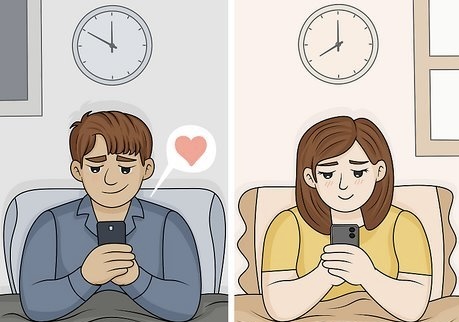Unmasking 'Hangxiety': Experts Reveal Who Suffers Most from Post-Party Dread!

The phenomenon known as 'hangxiety,' a term describing the emotional distress experienced after a night of drinking, has been recognized as a real and significant association between hangovers and increased negative affects, including anxiety, stress, and depression. Australian researchers, following a study of over 6,000 adults, confirmed this link, suggesting that certain individuals are indeed more susceptible to these intense emotional plunges.
Key factors contributing to the severity of hangxiety include acting in ways that contradict personal values while intoxicated. Individuals who find themselves saying or doing things that clash with their core beliefs often experience heightened feelings of embarrassment, regret, or anxiety during a hangover. These feelings can lead to excessive rumination and harsh self-criticism, which further exacerbates emotional distress. Moreover, people who are already prone to anxiety or low mood, or those who use alcohol as a coping mechanism for stress, tend to experience hangxiety more intensely. Those with higher emotional resilience, however, are often better equipped to manage and adapt to these post-drinking anxieties.
While the exact mechanism by which alcohol triggers hangxiety is not fully understood, previous studies shed light on alcohol's influence on mood and anxiety levels in the brain. Initially, alcohol can induce feelings of happiness and relaxation. However, as alcohol levels in the body decline, these positive feelings subside, often replaced by increased anxiety and depression, amplifying pre-existing emotional vulnerabilities.
Experts Rebecca Rothman and Dr. Blair Aitken from Swinburne University of Technology emphasize that hangxiety hits harder when people act out of character while drunk. They also highlight the challenges faced by individuals who struggle with emotional regulation—the ability to recognize and manage one's emotions in healthy ways. For those experiencing hangxiety, social support can play a crucial role in easing emotional discomfort, providing reassurance, and making individuals feel less isolated. Consulting a GP or a psychologist is also recommended to assess any underlying anxiety or problematic drinking patterns.
Interestingly, the research found that despite experiencing brutal hangovers and hangxiety, most people are not motivated to reduce their future drinking. Hangovers are often viewed as routine inconveniences or even rites of passage. When alcohol becomes a coping tool for stress, hangxiety can paradoxically reinforce a cycle: alcohol temporarily dulls discomfort, but when its effects wear off, the same negative feelings return, prompting another drink for relief. This loop helps explain why frequent hangovers rarely lead to meaningful behavioral changes, a finding consistent with previous research suggesting young adults often perceive hangovers as a minor yet inevitable consequence of binge drinking, prioritizing social enjoyment over negative effects.
Broader concerns about alcohol consumption persist, with leading experts agreeing that excessive drinking can cause permanent liver damage, various cancers, and increased blood pressure. The World Health Organization estimates alcohol kills three million people globally each year. Health guidelines recommend moderate consumption, with the NHS suggesting no more than 14 units per week, and US guidelines recommending no more than seven standard drinks a week for women and 14 for men.
Recommended Articles
Flu Shot Aftercare Alert: 3 Critical Things You Must AVOID for Best Results!
:max_bytes(150000):strip_icc()/DoctorsOffice-ahuang-2173-61191fe304704eb68af8f4c609e98858.jpg)
After receiving a flu shot, certain practices can enhance its effectiveness and minimize side effects. Limiting heavy al...
NCAA Clears Air Peace Co-Pilot Amidst Runway Incident & Denied Drug Allegations!

A July 13 runway excursion at Port Harcourt International Airport involving an Air Peace aircraft has ignited a dispute ...
Air Peace Pilots Face Scrutiny Over Alleged Alcohol Use After Runway Incident

The Nigerian Safety Investigation Bureau (NSIB) reported that an Air Peace crew involved in a July 13 runway excursion t...
Spicy 'Miracle' Hangover Cure Shocks Drinkers, Claims to Stop Vomiting!

A viral TikTok hack featuring raw ginger consumed before drinking alcohol claims to prevent hangover nausea and vomiting...
Selena Gomez Opens Up About Anxiety and Fear Despite Success at Fortune Conference

At Fortune’s Most Powerful Women conference, Selena Gomez opened up about her ongoing fears and anxiety despite her thri...
You may also like...
The 1896 Adwa War: How Ethiopia Defied Colonialism

Ethiopia with the exception of Liberia which was used as a settler place for freed slaves remains the only African Count...
Why We Need Sleep: Inside the Brain’s Night Shift

Even when you’re asleep, your brain is quietly up to something, sorting, cleaning, and working behind the scenes.
When Nollywood Meets Netflix: The Creative Tug Between Local Storytelling and Global Algorithms

Nollywood’s partnership with Netflix is rewriting the script for African cinema, offering global reach but raising quest...
Mozambique's LNG Megaproject: A Promise or Peril?

TotalEnergies is leading a consortium in Mozambique as it promises potential restructuring of the nation's energy se...
Aliko Dangote, Africa’s Wealth King: First African-Born Billionaire to Cross $30B

Aliko Dangote, the richest Black man in the world, has reached a new milestone, with a net worth of $30.3 billion, accor...
WAEC Conducts Trial Essay Test Ahead of Full Computer-Based WASSCE in 2026

The trial Computer-Based Test (CBT) for the WAEC essay was held on Thursday, October 23, 2025. The exercise was conducte...
Can Long- Distance Love really work?

Can love really survive when touch becomes a memory and connection lives behind a screen? For many, distance isn’t the ...
Nigeria’s Rental Crisis: House of Representatives Moves to Cap Rent Hikes at 20%

Nigeria's rental market has been under intense pressure, and now lawmakers are stepping in. The House of Rep. has called...